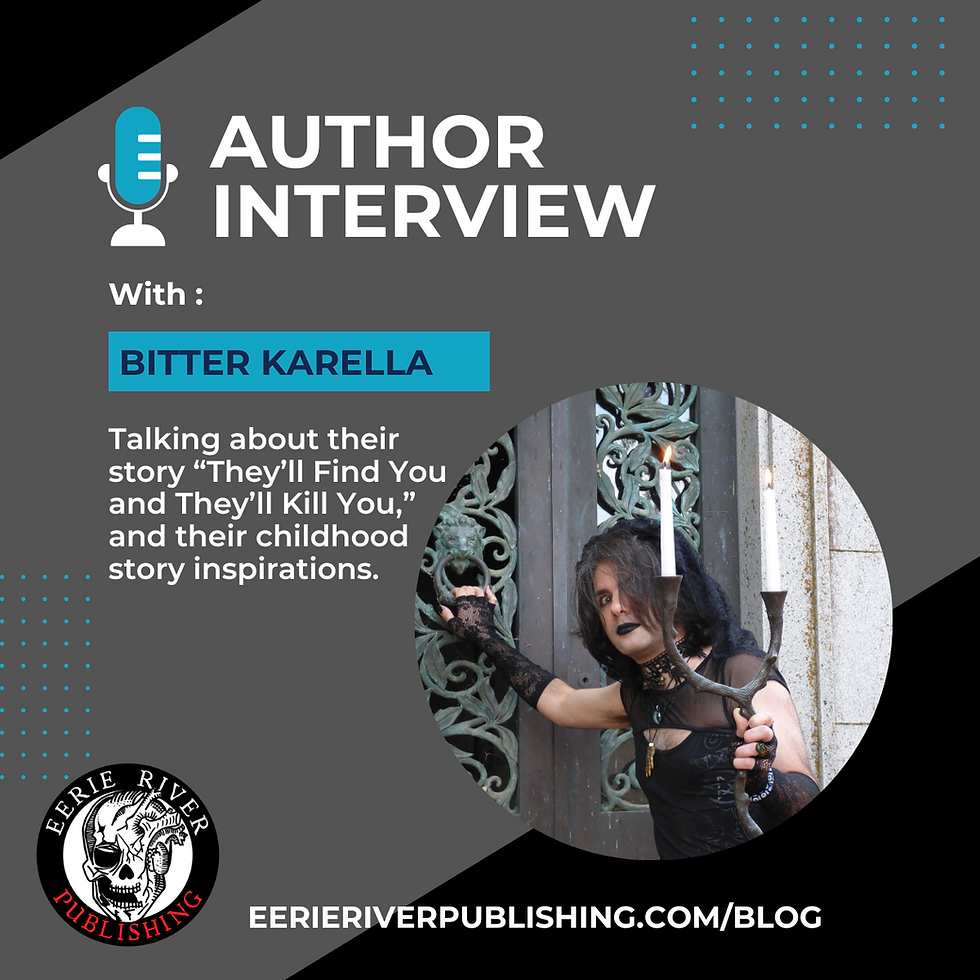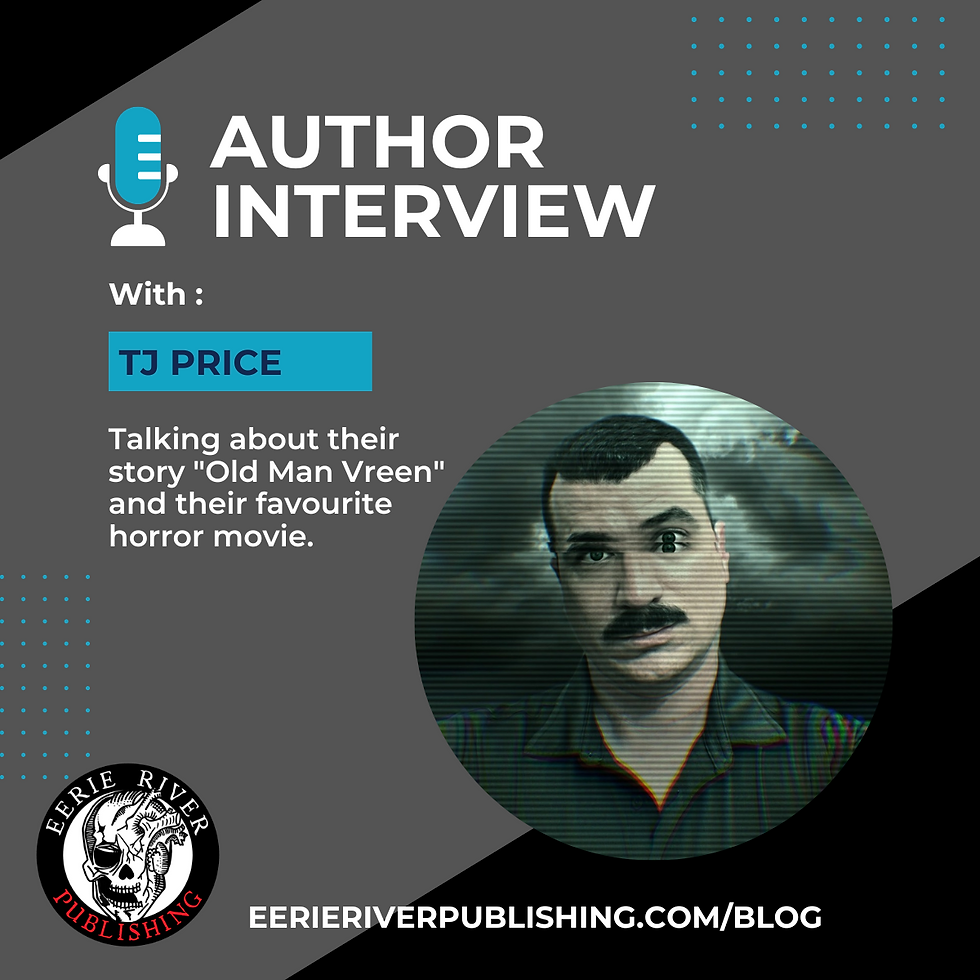Eerie Pride: Interview with William A. Wellman
- Eerie River

- Jun 14, 2022
- 5 min read

Thank you so much for sitting down with us for PRIDE month!
So, tell us a little bit about you. How did you get into writing?
I’ve enjoyed writing as long as I can remember, and a lot of my childhood hours went to writing stories about pirates and dinosaurs (and often some combination of the two). As a teenager I even finished a book for National Novel Writing Month. However, I’d fallen out of it as I’d gotten older, and focused on other creative pursuits such as animation and marketing.
Writing came back into my life all at once, when the horror genre first really kindled my interest. I was drawn to some of these darker stories that served an emotional purpose, and some of my first stories in this genre were written for Eerie River publications. Getting back into writing felt like coming home.
What piece of writing are you most proud of and why?
One of the things I think about often as a writer is that just as I look back and see the ways a story I wrote five years ago could be polished and fixed up further, some future version of me will look back on today’s writing the same. I expect I’ll be proudest of whatever I write tomorrow.
That said, my current writing project is a weekly fiction story (delivered in audio form as a podcast) called Hello From The Hallowoods, and I think it showcases a lot of development in my writing over the year and a half it’s been running. It was started with the hope to get more practice as a writer and to tell some impactful stories, and I think it’s accomplished both of those ends.
What is one underappreciated LGBTQIA2S author we should all check out?
Lauren Shippen is one of the veteran creators of audio fiction, but also a brilliant novelist in her own right. Her novels ‘The Infinite Noise’, ‘A Neon Darkness’, and ‘Some Faraway Place’ are innovative and beautiful on a bookshelf.
A story by two authors which I cannot recommend enough is the queer time-travelling spy epistolary poetry novel, ‘This Is How You Lose The Time War’, by Amal El-Mohtar and Max Gladstone. If you take nothing else from this interview, it should be to order this mind-boggling genre mashup. It’s sweet, wonderful, and brilliantly queer science fiction.
As a society we have come a long way in representation of LGBTQIA2S+ members, but there is still a long way to go. What would you like to see happen in the next few years and how do we get there in order to see that representation?
The ineffable Neil Gaiman once said ‘individuals make the future, and they do it by imagining that things can be different’. I often see authors wondering why it’s worth putting this time into their little worlds of fiction when there is a real life planet out there that’s perpetually on fire. However, I think we write the worlds we want to see, and the people who grow up reading those stories come to expect that’s the way the world is.
I think we’re seeing a huge boom in terms of queer authors telling their own stories–in Hollywood and television, certainly, but especially on the bookshelves and in the world of audio fiction. I think this is obviously the place to start when it comes to representation.
I also see a number of straight or cisgender authors saying that they are scared to pursue representation in their stories for fear of ‘doing it wrong’. I’d like to gently remind them that LGBTQIAS2+ people are, at the end of the day, just people, and share a great deal in common. We grapple with our fears, we laugh in the face of danger, and we run from monsters like anyone else. While I believe you shouldn’t write a story about the queer experience if you’ve never lived it, including queer characters in your larger narrative just reflects the real world. If you’re truly concerned about the way a character is represented, get a sensitivity reader to take a second look at the story. Research, with the exception of a few cosmetics test animals, also never hurt anyone.
Any advice for young authors beginning their author journey?
Your story is worth telling.
It will not, likely, be beautiful. It may be difficult to get through at times. There will be days where you miss your writing goals and have to wake up the following morning and try again.
But there is no shame in giving the world one more story, and if you are very lucky, it may someday fall in the hands of someone who sees themselves in it. The stories you wished you grew up with will exist because of your hard work.
And they are worth telling.
Do you feel an obligation to speak for or represent the LGBTQIA2S+ community through your writing?
I think it’s important to recognize that no one can represent the LGTBQIA2S+ community in full, and likewise, no story - even a ‘queer’ story - will be liked by all. However, I do feel that my purpose in writing stories is to provide queer people with reassurance that they are valid, that they will be loved, that things will be alright. In a sense, I’m not speaking for queer people so much as speaking to them. Which is maybe an odd message to receive from stories that come from the horror shelf at your bookstore, or the horror category on Spotify. Nevertheless, you see these themes at the heart of my work. I also believe specific representation is important, and have tried to encourage this when building out my casts of characters.
Who have been your biggest supporters?
Writing stories that are explicitly queer (often with accompanying themes like religious trauma, gender identity, or personal experiences) can often be difficult to bring up at the family dinner table. In my personal life, it’s been a blessing to have my family’s acceptance for these stories, as well as the support of other writers such as at Eerie River Publishing.
In terms of Hello From The Hallowoods, which rolls on to this day, I’ve been touched to find that listeners relate in terms of the story, but there’s also a patron community who continue to make the show possible. Without them, I truly wouldn’t be able to continue telling stories consistently in the way I do today, so I’m thankful to them above all else.
Follow this amazing human being everywhere:
William A. Wellman is a nonbinary horror author who can be found wandering the cold eastern shores of Canada, looking for knowledgeable crustaceans. Along with several stories published at Eerie River Publishing, they write the weekly podcast Hello From The Hallowoods, a queer horror fiction show, as well as the upcoming tie-in novel One Hundred Eyes In The Dark.
You can read more about them on their author website (https://www.williamwellmanwrites.com), Twitter (https://twitter.com/WilliamAWellman), or TikTok (https://www.tiktok.com/@williamwrites). If podcasts are your jam, you can learn aboutHello From The Hallowoods on the show’s website (https://www.hellofromthehallowoods.com), Twitter (https://twitter.com/TheHallowoods), or simply find it in your favorite podcast player.




Comments